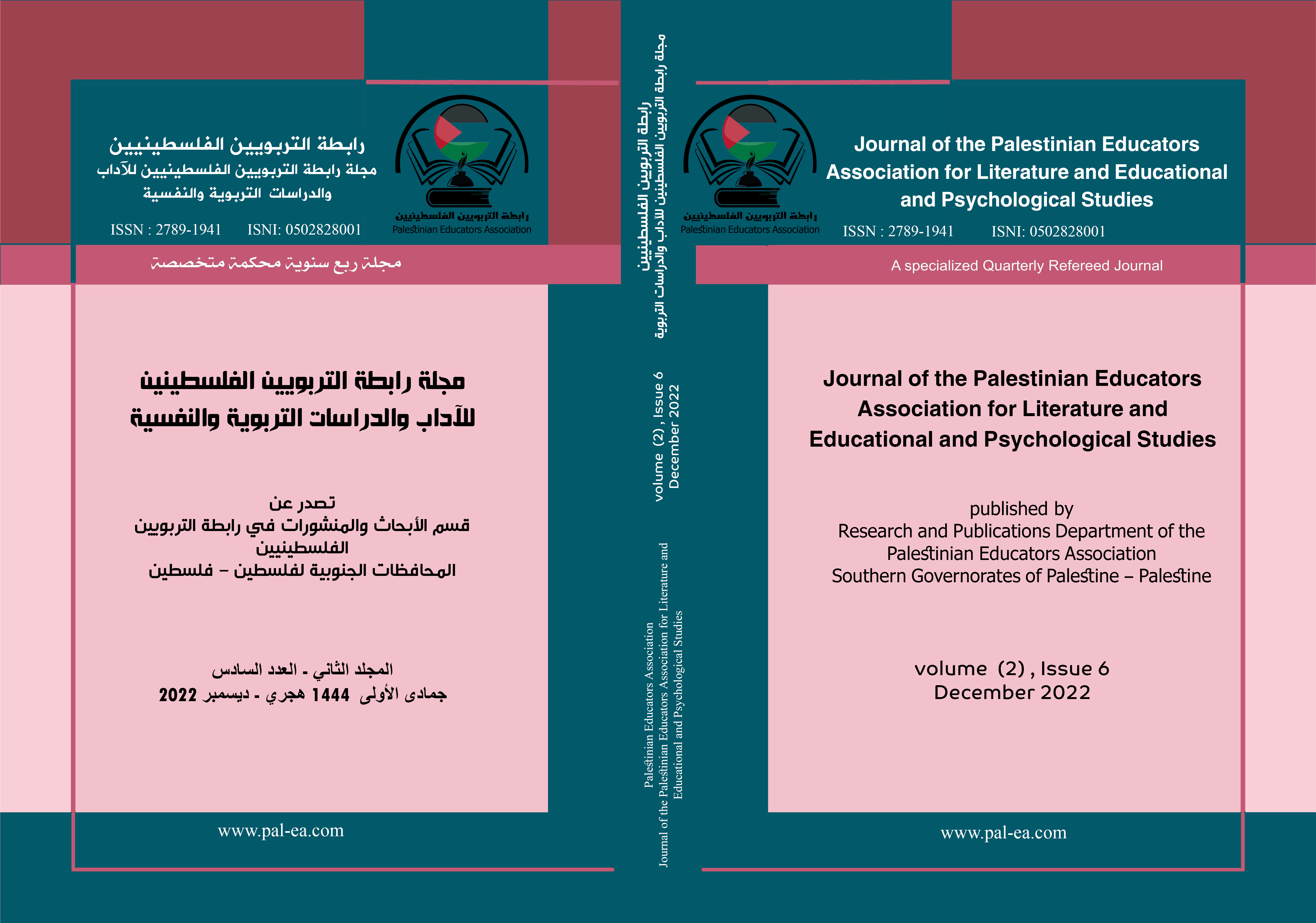Obstacles to developing creativity among the students of the University of Bahrain from the point of view of the faculty
Keywords:
Creativity, University of Bahrain, ObstaclesAbstract
The study aimed to identify the most important obstacles to the development of creativity among the students of the University of Bahrain from the point of view of the teaching staff. Developing a questionnaire that included (20) items distributed on four dimensions of obstacles, namely: obstacles related to educational courses, obstacles related to the university environment, obstacles related to the faculty, and obstacles related to the student. The results of the study concluded that there are obstacles from the point of view of the faculty when developing creativity among students, which are arranged as follows: obstacles related to the environment of the educational courses, then obstacles related to students, then obstacles related to the faculty, and finally obstacles related to the environment of the University of Bahrain. The results also showed that there were no differences between the gender of the faculty from their point of view regarding obstacles to developing creativity among students. The researchers recommended the need to pay attention to the development of creativity among students and work to intensify the specialized training courses in creativity for the teaching staff and the need to develop educational courses and work on presenting successful experiences in international universities by exchanging experiences between them.
Downloads
References
المصادر والمراجع
أولاً: المراجع العربية
بدير، سناء. (2021). دور الإدارة المدرسية في تنمية الإبداع ومعيقاته من وجهة نظر مديري ومديرات المدارس الحكومية في مديرية لواء الجامعة. مجلة العلوم التربوية والنفسية،5(39)، 1 - 22.
جروان، فتحي (1999). تعليم التفكير، عمان، دار الكتاب الجامعي.
العمري، غادة. (2020). دور التربية الفنية في تنمية مهارات الإبداع لدى طالبات المرحلتين المتوسطة والثانوية في مدارس إدارة تعليم شرق جدة من وجهة نظر معلمات التربية الفنية والطالبات: دراسة تطبيقية. المجلة الدولية للدراسات التربوية والنفسية، 8 (3)، 575 - 604 .
العنزي، سلامة (2020).معيقات تنمية التفكير الإبداعي لدى تلاميذ المرحلة الإبتدائية من وجهة نظر معلميهم بدولة الكويت. مجلة كلية التربية أسيوط، 36 (5).
قطامي، نايفة. (2003). تعليم التفكير للأطفال. عمان: دار الفكر للطباعة والنشر.
الطيطي، محمد. (2004). تنمية قدرات التفكير الإبداعي. ط2. عمان: دار المسيرة.
المجينة، فتحية. (2010). فاعلية استخدام استراتيجية التعلم التعاوني في تنمية مهارات التفكير الابتكاري ومستويات التفكير الهندسي لدى تلاميذ الصف الرابع الأساسي (رسالة ماجستير، جامعة مؤتة). قاعدة معلومات دار المعرفة.
منصور، زهير (1984). مقدمة في منهج الإبداع. الكويت:- دار ذات السلاسل للطباعة والنشر.
هيجان، عبد الرحمن (1999). معوقات الإبداع في المنظمات السعودية. الرياض:- مجلة الإدارة العامة، 39 (1)، 1-69.
الرشيدى، نوف . (2020). أساليب تنمية الإبداع الإداري ومعوقاته لدى مديري المدارس الثانوية في دولة الكويت. مجلة كلية التربية، 20(4) ، 55 - 104.
المراجع العربية الإنجليزية
Badeer, S. (2021). The Role of School Administration in Developing Creativity and its Obstacles from the Perspective of Government School Principals in the Al-Jami'a District (In Arabic). Journal of Educational and Psychological Sciences, 5(39), 1-22.
Grawan, F. (1999). Teaching Thinking, Amman, Dar Al-Kitab Al-Jame'i (In Arabic).
Al-Omari, G. (2020). The Role of Art Education in Developing Creative Skills among Intermediate and Secondary School Female Students in the Eastern Jeddah Education Management: An Applied Study (In Arabic). International Journal of Educational and Psychological Studies, 8(3), 575-604.
Al-Anzi, S. (2020). Obstacles to the Development of Creative Thinking among Elementary Stage Students from the Perspective of Their Teachers in Kuwait (In Arabic). Assiut Faculty of Education Journal, 36(5).
Qatami, N. (2003). Teaching Thinking for Children, Amman: Dar Al-Fikr for Printing and Publishing (In Arabic).
Atiti, M. (2004). Developing Creative Thinking Abilities, 2nd ed. Amman: Dar Al-Maseera (In Arabic).
Al-Mujaynah, F. (2010). The Effectiveness of Using Cooperative Learning Strategy in Developing Innovative Thinking Skills and Levels of Engineering Thinking among Fourth Grade Students (Master's thesis, Mu'tah University) (In Arabic). Dar Al-Maarefa Database.
Mansour, Z. (1984). Introduction to the Method of Creativity. Kuwait: Dar Dhât Al-Salasil for Printing and Publishing.
Hegan, A. R. (1999). Obstacles to Creativity in Saudi Organizations. Riyadh: Journal of Public Administration, 39(1), 1-69.
Al-Rashidi, N. (2020). Administrative Creativity Development Methods and Obstacles among Secondary School Principals in Kuwait (In Arabic). College of Education Journal, 20(4), 55-104.
ثانياً : المراجع الأجنبية
Davis, G,; Rimm, S. & Siegel, D. (2011). Education of the Gifted and Talented (6th ed). Pearson Education Inc.
Torranc, E. (1962). Guiding Creative Taient. Englewood Cliffs, NJ: Prentice – Hall.
Downloads
Published
Issue
Section
License

This work is licensed under a Creative Commons Attribution-NonCommercial-ShareAlike 4.0 International License.
The Journal of the Palestinian Educators Association for Literature, Educational and Psychological Studies
E-issn: 2789-1941
Authors retain Copyright
The Journal of the Palestinian Educators Association for Literature, Educational and Psychological Studies allows Authors retain Copyright and grant the journal right of first publication with the work simultaneously licensed under a Creative Commons Attribution (CC-BY) 4.0 License that allows others to share the work with an acknowledgment of the work’s authorship and initial publication in this journal.
Provided they are the owners of the Copyright to their work, authors are able to enter into separate, additional contractual arrangements for the non-exclusive distribution of the journal’s published version of the work (e.g., post it to an institutional repository, in a journal or publish it in a book), with an acknowledgment of its initial publication in this journal.
Authors are permitted and encouraged to post their work online (e.g., in institutional repositories, disciplinary repositories, or on their website) prior to
and during the submission process.










